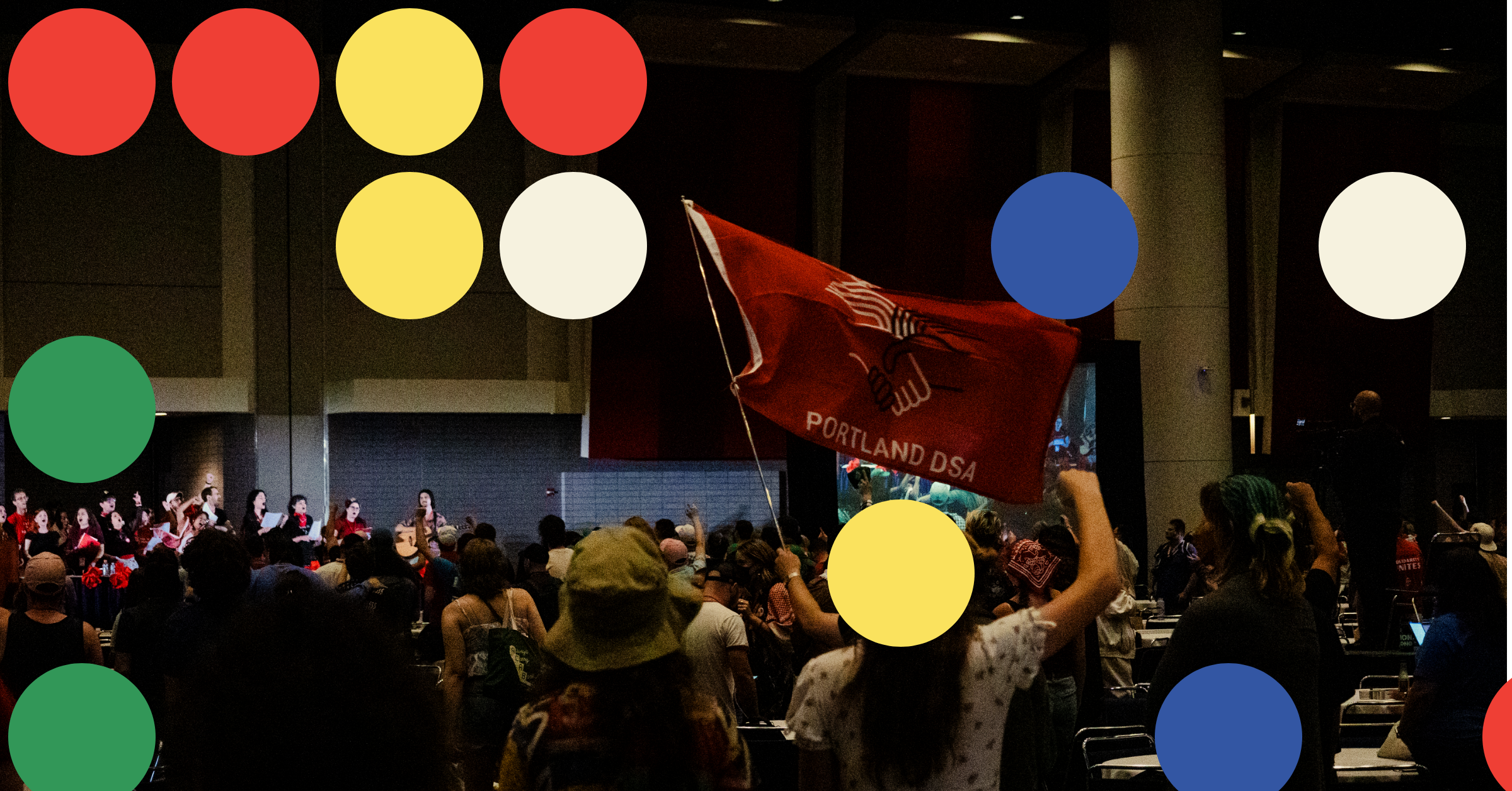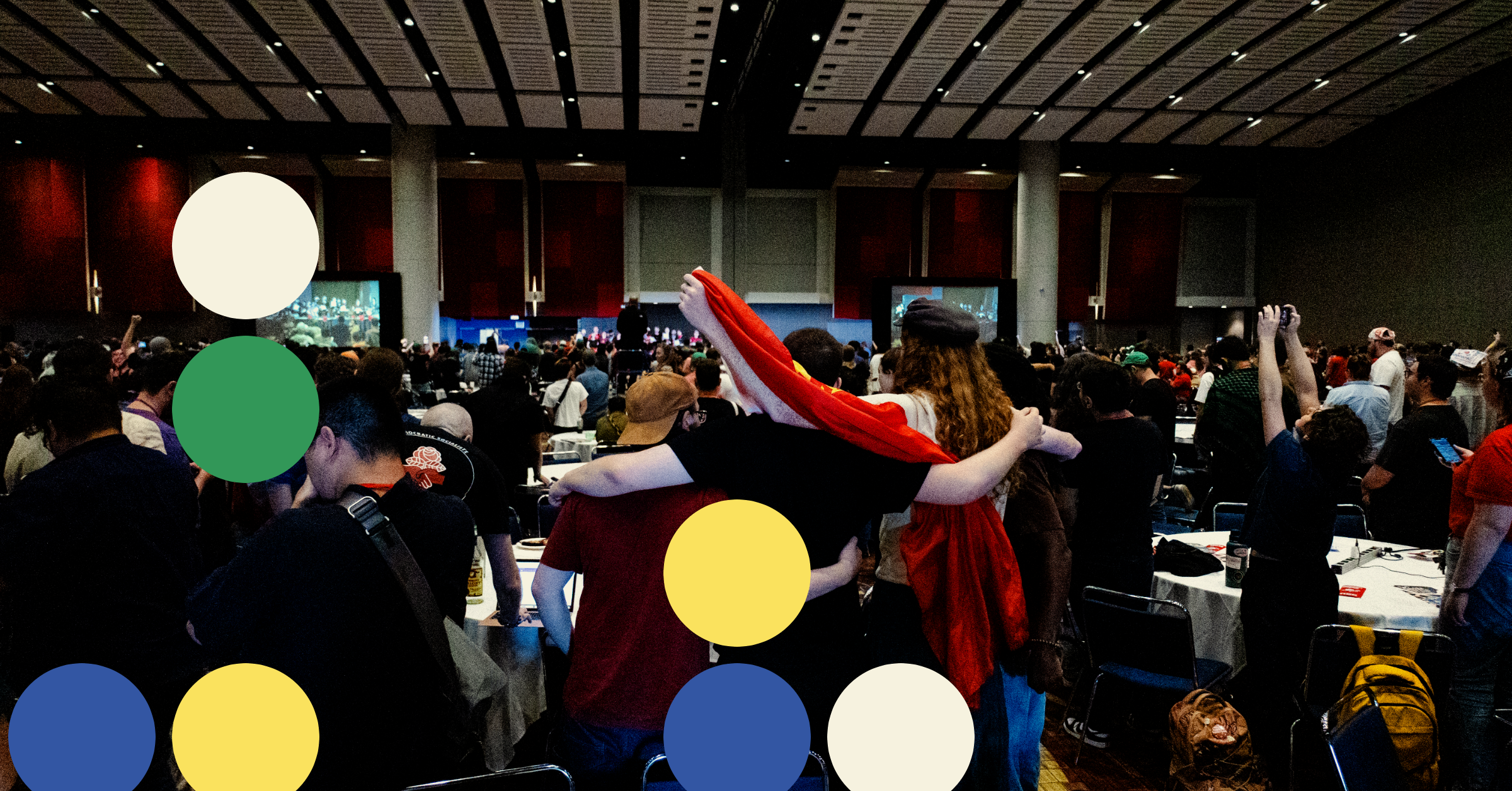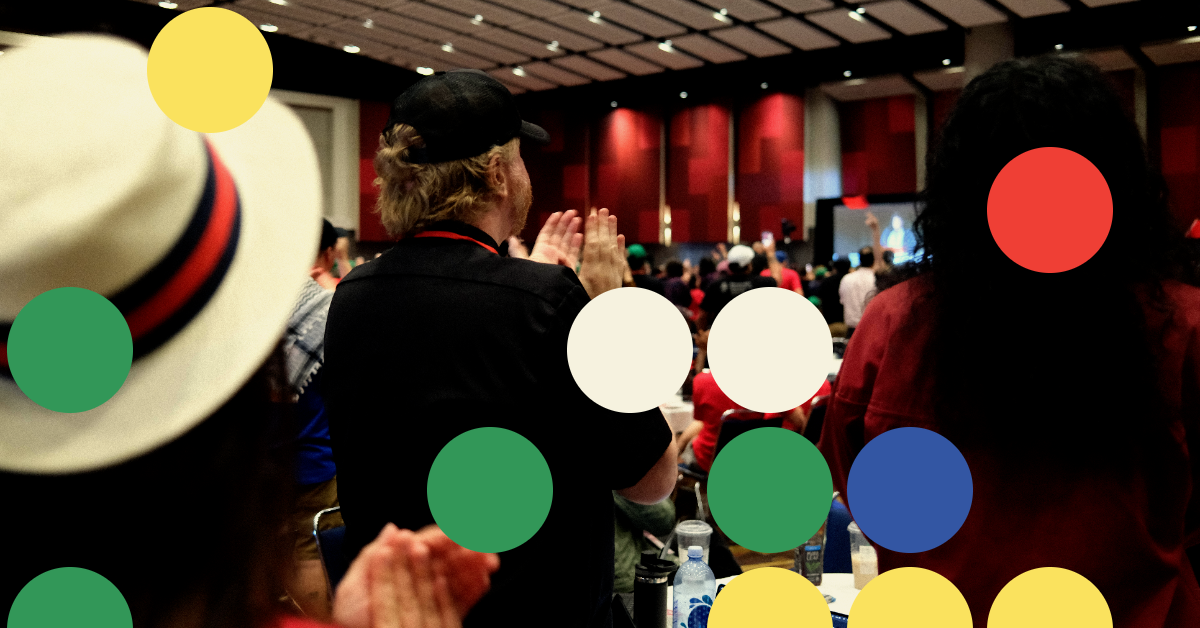Two proposals rooted in the idea of “One Member One Vote” mail ballot voting and member polling will be brought to the 2025 Democratic Socialists of America Convention. These would fundamentally change DSA’s structure. I’m going to refer to these as “mail ballot” elections to contrast with in-person voting.
Proponents say these proposals will improve and expand DSA’s democracy. They say the changes would bring members closer to the organization’s national operations and aid leaders in understanding the true will of the members.
Delegates should reject these proposals. There is no evidence that any of the supposed benefits will materialize. In fact, all of our actual experience in the organization cuts against any of these benefits materializing.
On the other hand, there is one specific result that is guaranteed: direct election of the National Political Committee (NPC) by the membership at large and frequent “polling” of the membership on complex issues will sever the connection between the Convention and DSA’s governance and policy. These proposals, particularly in tandem, will relocate power completely into the NPC on the one hand and into “digital space” on the other. There are other likely subsidiary effects. But there is no doubt that, at a minimum, these proposals, in particular one member one vote for the NPC, will in practice eliminate the importance of the Convention.
You can find these proposals here: One Member One Vote for National Leadership Elections; Member Polling.
The Convention Is the Highest Governing Body Because It Elects the NPC
Per the DSA Constitution, the national convention is the highest decision-making body in DSA (Article V Section 1). Delegates from every chapter can bring and debate proposals that bind and direct the national organization until the next convention. The NPC is subsidiary to the Convention; however, it is also called the highest decision-making body, with the qualifier “between meetings of the Convention” (Article VIII Section 1). That the NPC is the highest body “between meetings,” along with the fact that the Convention elects the NPC, means that the purpose of the NPC, up until now, has been to carry out the Convention’s dictates.
If the NPC is the highest decision-maker “between meetings of the Convention,” but is not chosen by the Convention, then, fundamentally, DSA will have two distinct “highest decision-making bodies,” organizationally, politically, and practically unrelated to one another. The Convention has no ability, in itself, to implement its policies; only the NPC can do that. But if the NPC is chosen by a constituency other than the Convention, there is no political connection between the Convention’s decisions and the NPC’s actions.
In practice, in fact, NPC members could run against the proposals and decisions of the Convention and, with a strong enough whipping operation, could win bare majorities and be both constitutionally permitted and politically empowered to overturn the will of the Convention.
In fact, direct member election of the NPC by mail ballot, instead of by the Convention, must be intended to sever the connection between the Convention and the NPC. The proponents of “One Member One Vote” are assuming there will be a different constituency between mail ballots and Convention elections; it is in essence a second bite of the apple, allowing a tendency unable to win over Convention delegates to compensate by whipping mail ballots to elect the NPC. Members vote directly for the delegates; if the electorate for delegates and electorate for the NPC was the same group, it would not be coherent to say that the NPC needs to be directly elected. Why assume the results would differ?
Given that the NPC operates constantly, this would leave the Convention a pointless superfluity. Why would delegates spend months crafting and discussing proposals, and spending their hard-earned money to fly across the country to debate and vote on them, when the outcome amounts to little more than a recommendation to the full-time “highest decision-making body” in the organization? The Convention would be reduced from a governing body to an activist “convening,” more akin to what advocacy nonprofits hold for their “activists.” The likelihood of this marginalization increases given that the NPC would also be responsible for writing the Convention’s rules.
This is a result disastrous to what makes DSA so critical for building working class organization: expanding workers’ understanding of democracy beyond mere voting to include participation, debate, and deliberation, expanding our political imaginations and empowering workers to lead in their workplaces and communities through their experience of democratic participation in DSA.
Direct Election Will Not Engage More Members
The contention that voting for leadership positions via OpaVote increases connection to or participation in the life of the organization is unsupported. Most chapters use this system for leadership elections, and there is nothing to suggest that doing has any relationship to increasing participation. In fact the inverse is likely true: that getting members involved is what will increase voter turnout.
By your own experience, is participation in mail ballot elections more than 15%? And, importantly, is the number of mail ballot voters ever significantly higher than the number of members who participate in other chapter activities in any given six-month period? In just about every DSA chapter, the number of mail ballot voters will be extremely close to the number of members who have been at least periodically active that year.
To use Los Angeles DSA as an example: Comrades Marc K. and Benina S. in their State of the Chapter address this year stated that just one of their chapter campaigns, Power to the Tenants, “engag[ed] 315 members in taking at least 2 actions,” over the year.
Los Angeles DSA, for its 2025 local leadership elections, had 290 voters for a two-person contest for Treasurer and 306 voters for a competitive 7-candidate, 5-seat Steering Committee election (both out of about 3,200 eligible voters). The chapter garnered 520 voters for a competitive delegate election, out of about 3,800 eligible voters. That is 9%, 10%, and 14% turnout respectively. That is typical for DSA chapters.
Leadership voting in Los Angeles DSA is by mail ballot election, precisely as “One Member One Vote” would be — with the major difference that in a local chapter, voters are more likely to have a direct connection to the candidates, raising the likelihood that they’re casting a vote meaningful to them. Yet the voter turnout numbers are not meaningfully greater than participation in one of the Chapter’s featured campaigns.
Interestingly, in Los Angeles, on the ballot with delegates were potential NPC candidates, seeking an endorsement from the Chapter. In other words, Los Angeles DSA’s members have just had an opportunity to vote for NPC candidates. And the result was 14% turnout, just 4% higher than the less competitive leadership election — and, importantly, featuring at least 90 more candidates, which number alone would account for 2% of that difference; intensive caucus whipping would more than account for the rest.
In other words, there was essentially no difference in voter turnout for a “national” election than for a local election, both of which featured mail ballots, and the voter numbers closely mirrored the member activity numbers. There is no reason to believe, and no articulated mechanism whereby, direct mail ballot voting would increase participation in organizational life.
‘The Convention Is Not Representative’
The problem these proposals seek to solve, often left unspoken or only obliquely referenced, is that the Convention is not actually representative of the membership.
There is a tendency, cutting across different caucuses, to believe that the Convention is in some way illegitimate. Either because the voting system used at the Convention (Scottish Single Transferable Vote, a ranked-choice voting system) benefits disciplined but small ideological tendencies, or because “paper members” do not participate in the delegate elections, the Convention is seen as either too sectarian, too divided, or overstuffed with ideological activists (but not organizational activists, i.e., people who “do the work”).
As a result, the argument goes, the Convention makes decisions that either do not reflect what the “average” member wants, or it makes decisions that are insufficiently concerned with the health and relevancy of the organization (for example, reckless spending or ideological purity tests of candidates). At their core, the 1M1V and polling proposals are meant as checks and balances against the Convention.
This premise is fundamentally flawed for a variety of reasons, but even if it were not, severing the connection between the Convention and the highest national leadership would not be the way to solve it.
First, there is no “average” member. The existence of that unseen “average” member whose ideas are more moderate than the typical Convention delegate is a dearly held belief of some tendencies. It is this member’s preferences that proponents of One Member One Vote want to be reflected in the composition of the NPC.
But there is no “average member,” in the same way that there are no “still rivers.” It is a basic misunderstanding of the nature of a political organization to treat the “paper” or “average” member as a static category. There are only members in different stages of development, all of whom we want to move through higher stages of development and engagement. As we’ve seen, simply inviting members to vote directly for leadership is not going to result in more engagement on its own. In fact, it’s vice versa: more engagement is the thing that will result in more voting.
Just imagine a “paper” member who has never been active in the organization to any degree, versus a “paper” member who has cycled through high and low activity. In any given period, say a year, both of these members might be equally inactive (“paper members”), but the latter member is much more likely to vote — and that vote will be informed by practical experiences with the local candidates for chapter office and the issues in the organization. That once-active, now-inactive member should not be assumed to be “moderate” or have some politically median view; their political opinions will still be informed by their experiences in the organization and by what’s happening in the world. And that will be highly variable and heterogeneous.
Second, there is no “will of the membership” floating somewhere but unable to be expressed because of the ideological composition of the Convention. Opinions about what a political organization should do are only coherent when they are based on experience with the organization. Setting aside the fact that, again, we want to move people into activity, it is odd to say that members whom we have not successfully involved in the life of the organization do have a coherent sense of the direction the organization should go.
The most rational explanations for why paper members don’t vote in chapter and delegate elections, despite receiving notices and email ballots they can easily fill out, is that they either do not feel knowledgeable enough to vote (nor want to choose names at random), or don’t feel they have a large enough stake in the results to participate. Both of these issues are cured through participation.
In fact, this approach to increasing voting numbers is more likely to create perverse incentives, for those who are most interested in winning votes by any means necessary. That is, if you take activity as the catalyst for more voter participation, you are creating empowered members — who will have their own relationships and experiences, and be less likely to simply take your direction for their ballots. Conversely, if you take voting as the entrée to more activity, you could lose the votes of those paper members who would otherwise simply take your direction. Thus you have less reason to actually involve them in the life of the chapter in a way that empowers them and builds the organization’s capacity. A list of paper members who vote your way is more valuable than a list of active members with complex experiences.
Reflect for a moment on the idea that it is a problem for the democracy of a political organization that never-active members do not vote, as opposed to the problem being that they’ve never been active, and therefore are not voting. If you want “paper members” to have their opinions reflected in the policy of the organization, the only solution is to get them active.
Once this has happened, these same members will be Convention delegate voters — and the Convention will therefore inherently be representative of the membership. If it is representative of the membership, severing it from the NPC only introduces a “separation of powers” political complication that will undercut the unity of the organization.
Polling Is a Political Tool, Not an Objective Measure
The membership polling proposal would empower a few large chapters to issue polls of uncertain language to the entire membership at their whim.
Currently, four or five chapters — say, New York City, Los Angeles, Metro DC, and Metro Detroit — could, through some unknown decision-making system, require the organization to vote on some issue of their choosing. The chapters represent “20% of the membership,” but how “the chapter” petitions for a poll is unstated, meaning that a vote of its leadership body on behalf of the membership would meet the requirement. So if a bare majority of the leadership bodies of these chapters pass a resolution calling for a membership poll, this means that a few dozen members could not only compel a poll but determine the parameters of the poll — particularly if they are working in cooperation with one another, say, for example, through intra-caucus coordination.
There is no controlling language regarding who gets to decide how the poll should be written or how it should be distributed, nor the options that will be made available to the members. The window dressing of “two forums” needing to be held two weeks before the poll does nothing to make the polls somehow deliberative; a national forum held via Zoom is closer in character to social media than in-person deliberation. In such a forum, held remotely with limited time and heavily moderated because of the number of participants, the opportunity for meaningful discussion and member-to-member communication is essentially absent.
More fundamentally, polls are often deceptive. Marxists should understand this intuitively. There are no still pictures in life; everything is always in motion. A poll drafted by a small group and “debated” through a heavily mediated on-line forum will do little but confirm what the authors of the poll intend it to confirm.
Introducing a question into a membership body should be a way to excite members, to involve them in an exciting national conversation, and most importantly to be a means of arriving at a politically informed answer. It should not be a means of buttressing the political position of leadership. As currently conceived, the proposal would simply be a cudgel one caucus or tendency could use against its political opponents in debates over policy.
Problems Do Exist
Despite all the foregoing, speaking only for myself, I’m not totally unsympathetic to the idea that there are ways to improve the election of the NPC.
For one thing, the two layers of STV voting may be skewing the ideological composition of the NPC, at least at the margins. That is to say, choosing the delegates in the chapters by STV makes sense, to protect the proportionality of ideological and political differences, which is critical in preserving DSA’s big tent. However, having that proportional body choose an executive body through STV again may result in outsized representation of not widely supported factions.
This has arguably been the case in past Conventions, where the compressed voting and debate timeframe of the Convention can allow one faction to grab an extra seat or two through momentary whims or quirks of the delegates and/or candidates. (Importantly, it is just as possible for a tendency, through control of a large chapter’s delegate election process, to send a disproportionate number of delegates to the Convention.) A different preferential or plurality voting system for the NPC, that rewards broad support more than intensity of support, could more directly address any legitimate concern about how representative the executive leadership is.
Secondly, direct election of national leadership is not in principle wrong. Again, the problem is not the broader electorate in and of itself; the problems are the severing of the relationship between the Convention and the NPC, and the erroneous premise that more voting will draw people into participation, when the inverse is true.
There are experiments with direct election that could actually address these problems. For one, having votes happen at chapter meetings instead of mail ballots. This welds voting with activity. Just about every active DSA member has a story of attending a meeting or event where being surrounded by comrades spiritedly and passionately engaging in politics inspired or even transformed them. If the elections happened during chapter meetings — even by mail ballots opened during the meeting and closed shortly thereafter, or some similar system — then members would be getting connected to the issues of the national organization in a way that we know works: through participation in chapter life.
Finally, as to “polling,” this has to happen, again, through activity. A process where chapters meet, discuss and debate an issue proposed by the national leadership, and take votes, can give the national leadership meaningful information on the mood of the membership, while also creating incentives to involve members in the active life of the organization.
Delegates should strive for a DSA that involves its members to inform their opinions, and should protect the Convention against irrelevancy, by rejecting these proposals.




